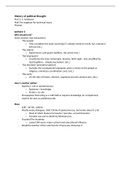History of political thought
Prof. E. S. Schliesser
Mail Tim wagelaar for technical issues
Thomas
Lecture 1
Who should rule?
Some answers (not exhaustive):
- ‘The people’
o They constitute the state (sovereign?), nobody needs to revolt, fair, nobody is
left out (etc.)
- ‘The elderly’
o Experienced, safe-guard tradition, risk averse (etc.)
- ‘The king/queen’
o Constitutes the state (sovereign), decisive, birth-right-- luck sanctified by
God/tradition--. Simple mechanism, (etc.)
- -The elect(ed)’ [president/cabinet]
o Excludes the incompetent/unpopular, gives a choice to the people or
religious, minimizes coordination costs, (etc.)
- ‘The party’
o On the side of history, decisive, organized around common aim, (etc.)
Here’s another option:
- Expert(s)- rule or epistemocracy
o Episteme = knowledge
o Krateo = to rule
- Presupposes that ruling is a craft/skill or requires knowledge (or competence)
- Used to be seen as antidemocratic
Plato
- 428? -347 BC, Athens
- Mostly wrote dialogues, didn’t think of epistemocracy, but wrote about it a lot
o Most of which feature his teacher, Socrates, as lead character
o Socrates was put to death by Athenian jury
- Founded The Academy
o Lasted 300 years: major cultural and educational influence
- Would be teacher of the ruler/tyrant of Syracuse, Dionysius II
, Brief Interlude on Athens.
- Athens was a so-called direct or popular democracy.
o Limited to free male citizens (about 30,000 people)
Excluding women, children, slaves, and resident foreigners
o Met in a regular assembly (ekklēsia).
All men could participate, vote (by raising hand), and speak freely
(isegoria) (but there were limits: Socrates was murdered for what he
said)
o For important/urgent matters (e.g., war) there was the boulē or council,
which was composed of 500 citizens who were chosen by lot (sortition) and
who served for one year
Many magistrates (important people) were also chosen by lot.
o The council (a) set the agenda for the assembly and (b) oversaw the Athenian
bureaucracy; (c) it was the main jury/judges in trials. <- unitary state
cf. Separation of powers (Polybius [200 –118 BC]; Montesquieu [1689-
1755]) De l'esprit des lois, (and Locke!)
The poor were subsidized to do so: because it took a lot of time
Athens was an empire, so had the money to do so
Fifth and Fourth Century Athens
- 492-449: Leading part of coalition
(with Sparta) in the wars that
defeated Persians
- 478ff: Athens became leader of
Delian league (Perikles)
o Voluntary, but it became a de
facto Athenian empire
o Athens controlled the navy
o The junior partners paid tribute to
Athens
- 431–404: Peloponnesian War
o Plague & defeat
- 404/3: Thirty Tyrants
o Led by Critias (a student of
Socrates)
- 399 Socrates convicted to death after
return of democracy (even though he didn’t kill anybody and wasn’t a part of
anything)
- 338: Athens defeated by Philip 1
Some interpretive decisions
- In a democracy the ship-owner = the people
- So, the unruly sailors are ambitious politicians (generally drawn from upper classes
[elites])
o [luckily, Socrates says this explicitly at 489 c]





